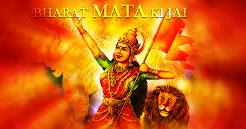

An Essay on Being Nationalist
Picture by artist mskumarBy Sunil Garodia
First publised on 2016-03-18 15:27:57
One-upmanship and the desire not to be left behind in the nationalist debate made self-confessed secular parties like Congress and NCP to support, indeed demand, that Waris Pathan, the MIM MLA in the Maharashtra assembly be suspended for refusing to say Bharat Mata ki Jai. In the process, these parties have contributed in seeming to make Bharat Mata ki Jai the only slogan that establishes oneâs nationalist credentials.
This is distressing and a sign of the times when the Hindu majoritarian parties are bent on deciding what constitutes nationalism. If they were to review their policies during the fight for Independence, they will find that many of their actions and utterances of their leaders then would have qualified as being anti-national. But that did not mean they were anti-national. Their view and the means to achieve Independence were different from those who were in the forefront of the fight but they were strongly nationalist despite that.
Hence, they should realize that trying to force a particular slogan down the throat of someone is not right. It is not as if Bharat Mata ki Jai is the given cry that every citizen makes when seized by nationalist fervor. Indians have various ways of praising their motherland. Jai Hind, Jai Bharat, Bharat Zindabad or Hindustan Zindabad are all equally nationalist proclamations. Anyone of them can be used instead of Bharat Mata ki Jai.
The insistence on using Bharat Mata ki Jai stems from the fact that like all other manifestations of gods & goddesses in Hindu religion, the motherland has also been deified and a goddess like image created for Bharat and this is now being used to challenge the Muslims. This is not right. Bharat is a conglomeration of many cultures, many identities and many religions. One of its major religions does not believe in idol worship. To expect its believers to hail something which has been deified as an image or idol is to tell them to go against their religion, which is blatantly unconstitutional. But Muslims should also see that the idols are an artistsâ impression, not sanctioned by any Hindu religious text. They should ignore them and say Bharat Mata ki Jai in the spirit of hailing the motherland. In fact, the community is divided over the issue and some leaders feel there is nothing wrong in saying Bharat Mata ki Jai.
The motherland has a place in every citizenâs heart and mind and it transgresses his religious beliefs. No religion has said that its believers should be disrespectful or unfaithful to their motherland. But when any proclamation clashes with a citizenâs religious beliefs and if it is not mandated by the Indian constitution, the citizen should be free to choose any of the other proclamations to hail the motherland. It does not make him or her any less nationalist and at the same time allows him to be faithful to his religion.
It is for the same reason Muslims object to reciting Vande Mataram. The first two words (which mean Hail Motherland) are all that most people know and they get perplexed why anyone should have problems in hailing the motherland. Later in the nationalist song, Bankim Chandra Chatterjee gives mother India the shape of an idol and equates her to goddesses Durga and Lakshmi. Will any Muslim, whose religion does not permit idol worship, sing paeans to Hindu goddesses? And does it make him anti-national for not doing it?
Vande Mataram is a Hinduâs description of how he sees his motherland. It is very patriotic and nationalist. A Muslim might see Bharat differently and that could also be very patriotic and nationalist. In fact, Mohammed Iqbal wrote Saare Jahan Se Accha in 1904 which was extremely patriotic. It is another matter that Iqbal changed his views in 6 years and started saying Hindustan belonged to the Muslims. But it does not take away from the fact that he expressed strong nationalist fervor, peaceful co-existence of communities and message of peace by all religions in the original Saare Jahan se Accha. Poet Allama Iqbal had also written "Pathar ki mooraton mein samjha hai tu khuda hai/ khaake watan ka mujhko har zarra devata hai (for you, an idol of stone is a god/every particle of the country's sand is a deity to me.)" Stirringly patriotic lines, although currently, Hindu nationalist might say that it insulted Hindus for their idol worship.
The literature of our great nation is rich and diverse. There are proclamations that hail the motherland in different ways and in different languages. All these are equally nationalist. Every citizen, irrespective of where he lives, what religion he follows, what he eats, what he wears and what politics he follows should be allowed the freedom to choose the way he expresses his nationalism. It is wrong to insist that one particular phrase signifies nationalism.
As for the Congress party, its duplicity is there for all to see. It had no problem when anti-national slogans were raised in JNU, another country was hailed and people talked of breaking India into thousand pieces. In fact, it supported the students in the guise of supporting free speech as it suited it to cause embarrassment to the government. Where were its nationalist credentials then? Now it is supporting the suspension of the MLA for not saying Bharat Mata ki Jai. Isnât it far more anti-national to support ones who chant Pakistan Zindabad than protest against ones who do not say Bharat Mata ki Jai but are willing to say Jai Hind?











